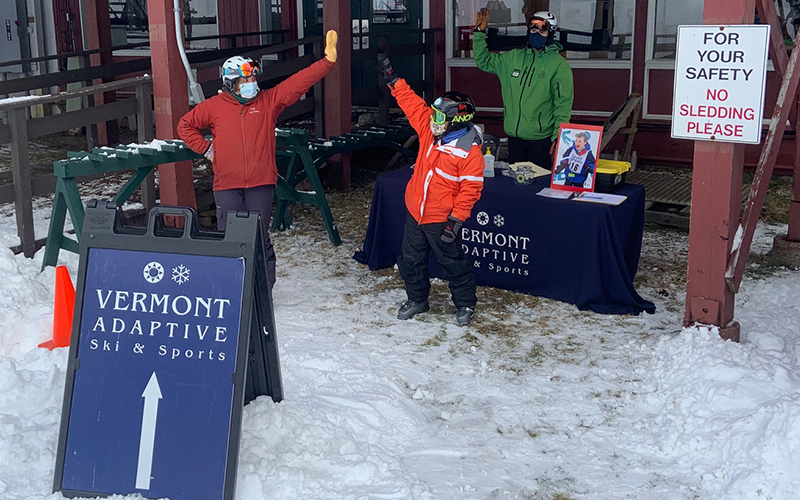As the pandemic descended on Vermont last spring, Vermont Adaptive Ski and Sports, an organization that offers skiing and snowboarding lessons to people of all abilities, scrambled to adjust to new health guidelines. “We had to adapt, but that’s what we do!” said Kim Jackson, director of communications at Vermont Adaptive. “We are physically distancing, wearing masks, staying 6-10 feet apart and doing what we need to do to stay healthy and safe.”
One of the many Vermont Adaptive locations is at Sugarbush Resort, where the organization gives many ski and snowboarding lessons. In addition to winter sports, the organization, as a whole, offers year-round environmental immersion programs, wellness programs and competitive sports training programs to people of all ages with a range of physical, emotional, behavioral, cognitive and developmental disabilities.
Currently, Vermont Adaptive at Sugarbush is offering individual ski lessons that have been modified and restricted to meet the state’s health guidelines. For instance, the Vermont Adaptive is only offering individual lessons, no groups. Additionally, only those who are complying to the state’s travel guidance and 14-day quarantine restriction are allowed to recreate at Vermont Adaptive. “The health and safety of our community is our first and only priority,” said Jackson.
“It’s critical to keep our community safe,” she continued. “We serve a population of people that are vulnerable to this virus, so we take everything very seriously. We are used to having everybody be able to play with us. But with some of the restrictions, that can’t happen right now.”
For Jackson, turning away athletes has been the hardest part of adjusting to the state’s health guidelines. “We want everyone to be able to play and be included. We’ve made some adjustments, like having participants have their family members in the same household assist on the lesson, but we’ll be happy when we can get back to normal,” she said.
Jackson admitted that Vermont Adaptive’s winter revenue stream has suffered due to the pandemic. “Normally we do bring in program revenue during the winter months, but because of the restrictions and protocols, we aren’t hosting as many lessons, so that revenue stream has taken a hit,” she said.
However, Jackson is grateful for the support of donors who have helped Vermont Adaptive stay afloat. “Right now, those individual donations mean so much more to us because of the low program revenue this year,” said Jackson.
For those who want to support the work of Vermont Adaptive without emptying their pockets, Jackson has some advice. “Wear your mask, stay socially distant, don’t gather in crowds, wash your hands and stay safe,” she said. “We are all in this together and by staying healthy and doing what we need to do, we ultimately keep those who are at highest risk safer.”
Right now, Vermont Adaptive’s local program space is located in the Mt. Ellen base lodge. However, the organization is set to begin construction on a new 4,000-square-foot sports facility at Mount Ellen this spring. The new three-story facility will be elevator accessible and have “lots of space and room for specific year-round programs and needs,” said Jackson.
Going forward, Vermont Adaptive will continue to update its protocols along with changes to state guidance. “As the state turns the spigot, we will as well. We follow the state’s lead,” said Jackson. “Vermont is doing so well and we want it to stay that way.”






